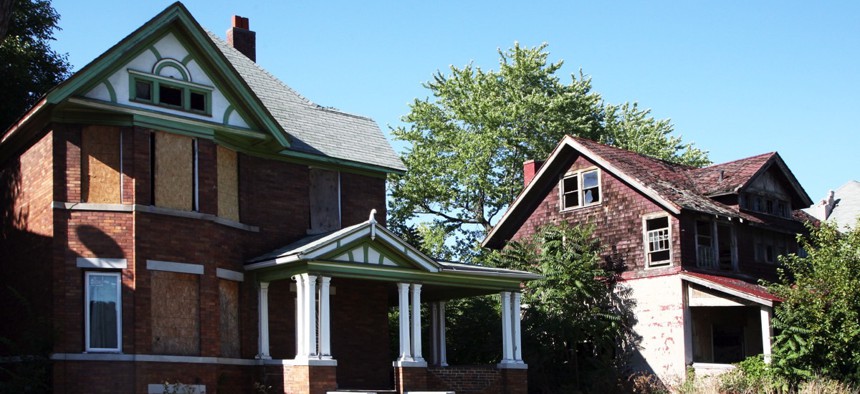The Treasury Department Just Awarded Up to $1 Billion to These 12 States and D.C.

Vacant homes in Detroit, Michigan

Connecting state and local government leaders
Funding is from the so-called Hardest Hit Fund, which is meant to address housing market issues.
As part of an ongoing program to reduce foreclosures and stabilize housing markets, the U.S. Department of the Treasury on Wednesday announced that a dozen states and the District of Columbia would gain access to $1 billion of federal funding.
That money comes on top of $1 billion the Treasury Department allocated in February through the program, known as the Hardest Hit Fund. A total of 17 states and Washington, D.C. have now been allotted money this year through the fund. Congress authorized $2 billion for the program in the omnibus spending bill that President Obama signed last December.
The Obama administration established the Hardest Hit Fund in 2010.
Initiatives carried out with money from the program vary from state-to-state but have included mortgage payment assistance for unemployed homeowners, principal reductions to get borrowers into more affordable mortgages, and the demolition of blighted properties.
The funding recipients announced Wednesday were also allocated money in the funding phase that took place in February. With the newly announced awards, top recipients this year include: California ($383 million), Illinois ($269 million) and Michigan ($262 million).

States will have until the end of December 2020 to use the money they’ve been allotted. This marks an extension of the federal program’s original end date, which was December 31, 2017.
Michigan plans to direct some of its money toward razing and repurposing abandoned properties in cities like Flint and Detroit.
“Communities across Michigan will benefit greatly from this huge influx of federal funds,” Rep. Dan Kildee, a Democrat who hails from a district that includes Flint, said in a statement Wednesday. “Removing blight raises property values for surrounding homeowners, decreases violent crime and unlocks greater opportunity for all families.”
After the first funding phase earlier this year, Michigan had been allotted about $74 million. The state’s additional allocation, revealed Wednesday, was around $188 million.
According to Detroit Mayor Mike Duggan’s office, the city has the largest blight removal program in the nation. Duggan said in a statement Wednesday that it was not yet clear what share of the newly allotted money would go to Detroit. After the initial allocation, the city’s cut was set to be $42 million, he said. Duggan estimated that Detroit would be able to up the pace of blighted house demolitions in the city to 6,000 next year, from 4,000 last year.
In a report issued in 2014, a task force said roughly 40,000 structures in Detroit suffered from blight and recommended they be removed.
The Hardest Hit Fund was initially created to help the places worst-affected by the housing foreclosure crisis that coincided with the Great Recession. Since its inception, $9.6 billion dollars have been allocated through the fund, according to the Treasury Department.
Bill Lucia is a Reporter for Government Executive’s Route Fifty.

NEXT STORY: Unaccompanied Minors–the State and Local Story





